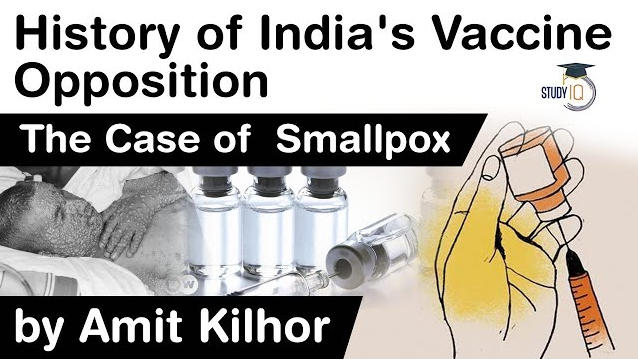Table of Contents

- the father of immunology”, and his work is said to have “saved more lives than the work of any other human”
- On June 14, 1802, three-year-old Anna Dusthall, born to the female help of a British officer in Bombay, became the first child in India to successfully receive the world’s first vaccine.
- From the pus that formed on her skin upon vaccination, five more children were vaccinated against smallpox. Thereafter, enough vaccine material was collected using her lymph, and sent to different parts of the subcontinent.

- Smallpox was endemic throughout the Indian subcontinent, turning into an epidemic every five years or so, with a mortality of one in three cases. The success of vaccination was, therefore, a cause for imperial optimism.
- But the vaccine was not easily accepted in India. As recent research has shown, British and Indian officials had to grapple with significant public unwillingness to get vaccinated, with each section of society having its own reasons to resist.
The first shot: a cross-continental relay
- The vaccine, created by the English scientist Edward Jenner, used cowpox to produce immunity against smallpox. (The word “vaccine” comes from the Latin vacca for cow and vaccinia for cowpox).
- By 1800, Jenner’s vaccine was delivered “arm-to-arm”, where lymph was taken from vaccine incisions and administered to other subjects. In 1799, Jenner sent threads soaked in lymph vaccine to Vienna; and from Vienna to Baghdad via Constantinople (today’s Istanbul).
- A vaccinated child from Baghdad was sent to Bussorah (Basra), and from the child’s arm, successful vaccinations were performed. In May 1802, a batch of lymph was despatched to Bombay, where Dusthall was among the 20-odd children to receive it, but the only successful outcome.
- This relay was often lauded in official accounts, but the British administration was yet to fully comprehend the problem of lymph logistics.
Neutralising the influence of ‘tikadars’
- In 1805, John Shoolbred, the superintendent general of vaccine inoculation, expressed keenness for Bengal to receive the vaccine. But “the whole tribe of Brahmin inoculators” were determined enemies of the new practice, he noted, and were using their influence to stop parents from presenting their children for vaccination.
- The “tikadar” or inoculator/variolator was a product of the region’s existing method of developing immunity against smallpox. Tikadars would manually induce smallpox with preserved dried scabs from previously inoculated subjects. The scabs were first purified in Ganga water, and the subjects were prepared for inoculation through abstention from fish, milk, and ghee.
- Vaccine hesitancy, also known as anti-vaccination or anti-vax, is a reluctance or refusal to be vaccinated or to have one’s children vaccinated against contagious diseases. People who subscribe to this view are commonly known as “anti-vaxxers”. The term encompasses outright refusal to vaccinate, delaying vaccines, accepting vaccines but remaining uncertain about their use, or using certain vaccines but not others. Arguments against vaccination are contradicted by overwhelming scientific consensus about the safety and efficacy of vaccines.
- The World Health Organization views vaccine hesitancy as one of the top ten global health threats
Resistance, including opposition by Gandhi
- In 1898, Britain stopped arm-to-arm vaccinations, saying syphilis and hepatitis spread through the practice. Calf lymph was seen as a safer alternative — and also one that would be acceptable to high caste Indians who believed it was ritually polluting to be vaccinated with the lymph of lower caste children. But of course, that was not to be.
- In 1913, when he was still in South Africa, Gandhi expressed his strong opposition to vaccination, calling it “sacrilege”: “Vaccination seems to be a savage custom. It is one of the poisonous superstitions of our times the equal of which is not to be found even among so called primitive societies… Vaccination is a filthy remedy. Vaccine from an infected cow is introduced into our bodies; more, even vaccine from an infected human being is used… I personally feel that in taking this vaccine we are guilty of a sacrilege.
- Writing in ‘Navjivan’ in 1929, and in a letter to Manilal and Sushila Gandhi that same year, he wondered “how vegetarians can ever take such vaccine”, and described vaccination as “tantamount to partaking of beef”.
The need for understanding fear and creating trust
- There has never been a time when opposition to vaccines has not existed — there will always be those who will take any vaccine that is offered, and those who will refuse every vaccine, no matter how much the scientific evidence, said epidemiologist and vaccinologist Dr Chandrakant Lahariya, co-author of a recent book on India’s fight against the Covid-19
- Behavioural science is needed along with medical science in this regard, he said. Administrations have to earn the public’s trust in vaccines — and one of the ways of achieving this could be for influential members and leaders to take vaccines to set the precedent.
- Vaccination policy involves complicated ethical issues, as unvaccinated individuals are more likely to contract and spread disease to people with weaker immune systems, such as young children and the elderly, and to other individuals in whom the vaccine has not been effective. However, mandatory vaccination policies raise ethical issues regarding parental rights and informed consent.
Summary
- Anna Dusthall – The first person to be vaccinated in India
- Anti-Vaxxers
- Gandhi was a Vaccine sceptic
- Public health issues arising out of Vaccine Hesitancy
- To create Trust and understand fear of vaccines
Latest Burning Issues | Free PDF























 WhatsApp
WhatsApp